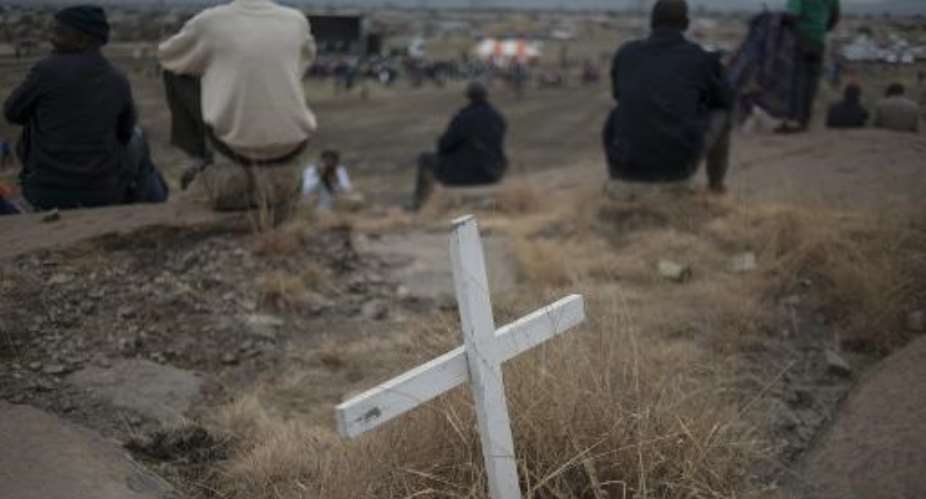Johannesburg (AFP) - A South African police operation that left 34 striking workers dead at Marikana platinum mine in 2012 was "defective" and should "not have taken place", a long-awaited report by a commission of inquiry showed Thursday.
Presenting the commission's findings, President Jacob Zuma described the August 16, 2012 shooting -- the deadliest use of force by the security forces since the end of apartheid -- as "a horrendous tragedy that has no place in a democracy".
"The commission found that the police operation should not have taken place on the 16th August because of the defects in the plan," said Zuma in a public broadcast.
He said the commission of inquiry recommended "a full investigation under the direction of the director of public prosecutions... with a view to ascertaining criminal liability on the part of all members of the South African Police Service who were involved in the incidents."
On August 16, 2012, after days of violent protests at Lonmin platinum mine northwest of Johannesburg, police opened fire on a group of demonstrating workers, killing 34 people.
In the days leading up to the attack, 10 others had been killed in violence related to the strike -- including non-striking miners, security guards and two police officers who were hacked to death.
But the commission found a police operation to forcefully remove the miners, a few of whom were armed, should not have been carried out.
"It would have been impossible to disarm and disperse the strikers without significant bloodshed," the report concluded, slamming the poor police communication on the day and the "complete lack of command and control" at one of the shooting scenes.
Within days of the shooting, Zuma established the Farlam Commission of Inquiry to investigate the events at Marikana, with the power to recommend certain individuals be criminally charged.
The commission's report was handed to the president on March 31 after more than two years of hearings plagued by delays.
Lawyers for the families of the dead and injured miners' labelled the incident an act of revenge by the police for their fallen colleagues, asking that senior police officials be held accountable.
The commission's report cleared senior government officials for any culpability in the incident, including then police minister Nathi Mthwethwa and former mines minister Susan Shabangu.
The commission did however recommend that an inquiry be held into National Police Commissioner Riah Phiyega's fitness to hold office.
But mining house Lonmin was slammed for failing to resolve the wage dispute or provide adequate protection for non-striking miners.
"Lonmin also insisted that those employees who were not striking should come to work despite the fact that it knew that it was not in a position to protect them from attacks by strikers," said Zuma.
The National Union of Mineworkers (NUM) and the Association of Mineworkers and Construction Union (AMCU) also came under fire for failing "to exercise effective control" over their members "in ensuring that their conduct was lawful and did not endanger the lives of others".
Zuma described the incident as a "painful episode" that the country should learn from.
"Breadwinners were taken away from their families in a brutal manner and untold pain and suffering befell the families and relatives," Zuma said.
"The entire South African nation was shocked. The world was also shocked."





 Whoever participated in the plunder of the state must be held accountable – Jane...
Whoever participated in the plunder of the state must be held accountable – Jane...
 A vote for John and Jane is a vote to pull Ghana from the precipice of destructi...
A vote for John and Jane is a vote to pull Ghana from the precipice of destructi...
 I’ll repay your abiding confidence with loyalty, understanding and a devotion to...
I’ll repay your abiding confidence with loyalty, understanding and a devotion to...
 ‘I’ve learnt deeply useful lessons for the future' — Serwaa Amihere breaks silen...
‘I’ve learnt deeply useful lessons for the future' — Serwaa Amihere breaks silen...
 I’m sorry for the embarrassment – Serwaa Amihere apologises for leaked sex video
I’m sorry for the embarrassment – Serwaa Amihere apologises for leaked sex video
 Dumsor: Matthew Opoku Prempeh not in charge of Energy sector – Minority
Dumsor: Matthew Opoku Prempeh not in charge of Energy sector – Minority
 Adu Boahen’s murder: Police arrest house help who was in possession of deceased’...
Adu Boahen’s murder: Police arrest house help who was in possession of deceased’...
 Akufo-Addo nominates Felicia Attipoe as Tema West MCE
Akufo-Addo nominates Felicia Attipoe as Tema West MCE
 Election 2024: I can't have someone I defeated twice as my successor – Akufo-Add...
Election 2024: I can't have someone I defeated twice as my successor – Akufo-Add...
